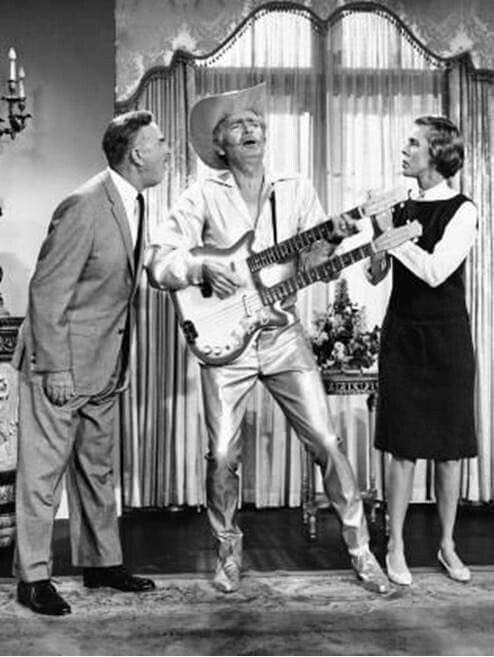Rich? Bitch!
Set aside country-fried
A dawning awareness of our family’s place in the economic strata – blue-collar, working class – probably came while in the way-back of the family station wagon as we rolled through a tony neighborhood and my father whistled low as my mother proclaimed it “Nice.” I didn’t equate “nice” with “better off” until I first saw The Beverly Hillbillies (which premiered the year I was born, 1962) and gleaned that some had more than others. The Beverly Hillbillies was also ground zero of a none-too subtle propagandizing that said “Despite their resources, these rich folks aren’t happy.” In the very first Beverly Hillbillies episode – “The Clampetts Strike Oil” as patriarch Jed ponders what to do with his new-found riches he asks his cousin “What do you think, Pearl? You think I oughta move?” She says “Jed, how can ya even ask? Look around you. Ya eight miles from your nearest neighbor. You’re overrun with skunks, possums, coyotes, bobcats... You use kerosene lamps for light. You cook on a wood stove, summer and winter. You’re drinkin’ homemade moonshine, washin’ with homemade lye soap, and your bathroom is fifty feet from the house – and you ask should you move?”
After a beat, Jed responds...
“Yeah, I reckon you’re right. Man’d be a dang fool to leave all this.”
When the nouveau riche Clampetts do head west for what was then the ne plus ultra of luxurious living (nowadays they’d decamp for Dubai), except for cousin Jethro (a 6’ 4” walking, talking cautionary tale of the disasters that await when you forego your humble roots) they’re wholly unimpressed by the trappings of wealth. Jed never upgrades the family’s clunker or changes his wardrobe. Granny has a root cellar where her moonshine still continues to crank out her “remedies.” They call their built-in pool a “cee-ment pond” and naturalist Ellie May stocks it with “critters.” Their well-to-do neighbors are consistently aghast at the antics of these hayseeds but we’re meant to identify with the Clampetts, who never “put on airs” despite Jethro’s grasping. Ultimately, social-climbing second-fiddle characters like the banker Mr. Drysdale come off like greedy soul-dead snobs compared to the down-home unsophisticated pure goodness of the formerly broke-ass-now-suddenly-oil-rich Jed Clampett.
The shows creator, Paul Henning, doubles down on the Rich=Wrong equation with his two other “Hillbilly Triad” shows, Petticoat Junction and Green Acres. In the former, Dennis Hopper appears in an early black-and-white episode as a “New York Beatnik Poet” and we’re meant to understand the subtext of those words: “Pretentious Confused Elitist Layabout.” Green Acres takes the premise to its logical conclusion. Oliver – who sings “Keep Manhattan, just give me that countryside”– drags sophisticate wife Lisa – who “…just adores a penthouse view” - to a backwater where he proceeds to get schooled via the timeless wisdom of the locals and an indoor pig named Arnold.
Growing up 45 miles due east of Manhattan, the Paul Henning shows and Hee-Haw were as close as I got to “the country” until our family vacationed on a working farm in Pennsylvania, where we drank raw milk and were stricken with sunburn so severe it resigned us collectively to bed for a day. Unlike Lisa Douglas, I didn’t naturally take to rural life, preferring easy access to “the city” via the Long Island Rail Road (LIRR). For many Long Island kids the first trips into Manhattan happened via train around this time of year, to visit the Museum of Natural History or see the Rockettes at Radio City and the tree in Rockefeller Center. Stunned by the magnitude of it all, I don’t recall feeling intimidated by the skyscrapers or teeming streets or sheer number of people. It thrilled and exhilarated me. I wanted more and by the time I was a teenager I’d regularly venture into Manhattan sans chaperone. The LIRR glided you from Lindenhurst into Penn Station via the Babylon line in just under an hour (depending on the situation at Jamaica). My friends and I would attend arena rock shows at Madison Square Garden or hang out in pre-Disney seedy Times Square or catch a movie at a revival house. Later, with the Nihilistics, I’d drive into the city to play at clubs now long gone. It hadn’t occurred to me then but this was a Manhattan down on its knees, a once-proud metropolis now broke (“Ford to City: Drop Dead”), and perhaps another reason I didn’t envy the wealthy.
Had I been born with that singularly-American ambitious, entrepreneurial striver’s gene I might’ve overcome Paul Henning and Gerald Ford and my parents. But all I ever wanted was a steady job and enough money to pay my bills on time and not have to eat ramen every night. When I discovered punk rock and – later – hardcore music, my class-consciousness became solidified. The rich and powerful are oppressors to be overthrown or, better yet, eaten. Long before Donald Trump entered the national scene I remember thinking “Fuck this rich asshole.” while suspecting he made his millions, like his brethren, dishonestly. But I ended in a strange liminal space. I don’t think it’s nobler or purer to be poor or blue-collar or working-class and despite the offspring of Paul Henning (every reality show with a subtext of See? These rich people are actually miserable! – looking at you, Real Housewives franchise), I believe money can buy happiness up to a point. Research shows that “being comfortable” means far less stress, which means far better mental and physical health outcomes.
Somehow, I did okay for a kid from Lawn Guyland who got zero early career or financial advice but honed a particular set of skills and exploited a series of lucky breaks until I landed a six-figure job talking with the sort of people (truck drivers) who also resented the elites but then decided to help one become President.
Perhaps they should’ve listened to less country music and more punk rock.


